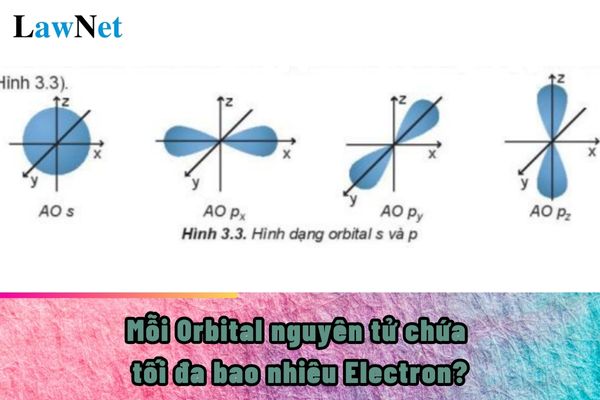What is the maximum number of electrons in an atomic orbital? What are regulations on evaluation of educational outcomes in Chemistry curriculum in Vietnam?
What is the maximum number of electrons in an atomic orbital?
Atomic orbital and electron are terms currently used in the subject of Chemistry.
|
What is the maximum number of electrons in an atomic orbital? This is an important rule in the electron configuration of an atom, known as the Pauli exclusion principle. This principle asserts that in an atom, no two electrons can have the same set of four quantum numbers. |
Note: Information is for reference only./.

What is the maximum number of electrons in an atomic orbital? What are regulations on evaluation of educational outcomes in Chemistry curriculum in Vietnam? (Image from the Internet)
When do students in Vietnam learn atomic orbital?
According to Section V of the Appendix of the General Education Program in Chemistry issued with Circular 32/2018/TT-BGDDT, the specific content and achievement requirements for grade 10 are as follows:
Structure of the Atomic Electron Shell
- Present and compare the models of Rutherford - Bohr and the modern model describing the movement of electrons in an atom.
- Define the concept of an atomic orbital (AO), describe the shape of AO (s, p), and the number of electrons in 1 AO.
- Present the concept of electron shells, subshells, and the relationship between the number of subshells in a shell. Relate the number of AOs in a subshell, in a shell.
- Write the electron configuration of an atom by shell, subshell, and orbital knowing the atomic number Z of the first 20 elements in the periodic table.
- Predict the basic chemical properties (metal or non-metal) of the corresponding element based on the electron configuration of the outermost shell of the atom.
Thus, atomic orbitals are taught in the grade 10 Chemistry curriculum.
What are regulations on evaluation of educational outcomes in Chemistry curriculum in Vietnam?
According to Section VII of the Appendix of the General Education Program in Chemistry issued with Circular 32/2018/TT-BGDDT, the evaluation of educational outcomes is as follows:
- The goal of evaluating educational outcomes is to provide accurate, prompt, and valuable information about the level of achievement required by the program and the students' progress to guide learning activities, adjust teaching activities, management, and program development, ensuring the progress of each student and improving the quality of education.
- The basis for evaluation is the requirements for qualities and competencies as stipulated in the general program and the Chemistry program. The evaluation scope includes the entire content and achievement requirements of the Chemistry curriculum.
- Evaluation forms, methods, and tools:
+ Evaluation forms: Combine process evaluation (regular evaluation), summative evaluation (periodic evaluation), broad-scale evaluations at the national and local levels, and international evaluation cycles to ensure comprehensive, regular, and integrated assessment into teaching and learning activities of teachers and students.
+ Evaluation methods and tools:
- Combine teacher evaluation with student self-evaluation and peer evaluation. Combine situational evaluation; evaluation through testing; evaluation through projects and portfolios; evaluation through feedback and reflection; evaluation through observation.
- Combine evaluation of learning products (essay tests, objective tests, oral presentations, practical experiments, research projects,...) with evaluation through observation (attitudes and behaviors in discussions, teamwork, experiments, field trips,...).
- Select appropriate methods and tools to evaluate a specific competence.
+ To evaluate the component of chemical cognition competence, questions (oral, written), exercises,... requiring students to present, compare, systematize knowledge or apply knowledge to explain, prove, solve problems can be used.
+ To evaluate the component of understanding the natural world from a chemical perspective, the following methods and tools can be used:
- Checklists or record observations results of teachers according to predetermined criteria about the process of conducting experiments and students' exploration tasks,...
- Questions, tests to evaluate students' understanding of experimental skills; reasoning ability to draw conclusions, test solutions, process given data to make conclusions; ability to design experiments or studies to perform a given learning task and propose appropriate devices and techniques,...
- Reports on experiment results, practice, performing research projects,…
- To evaluate the component of applying learned knowledge and skills, students can be required to present real-world problems that need solving, using chemical language, charts, models, experimental skills,... to describe and explain the chemical phenomena in the examined problem; use questions (oral or written answers required) to require students to apply knowledge and skills to solve learning problems, particularly real-world issues.

